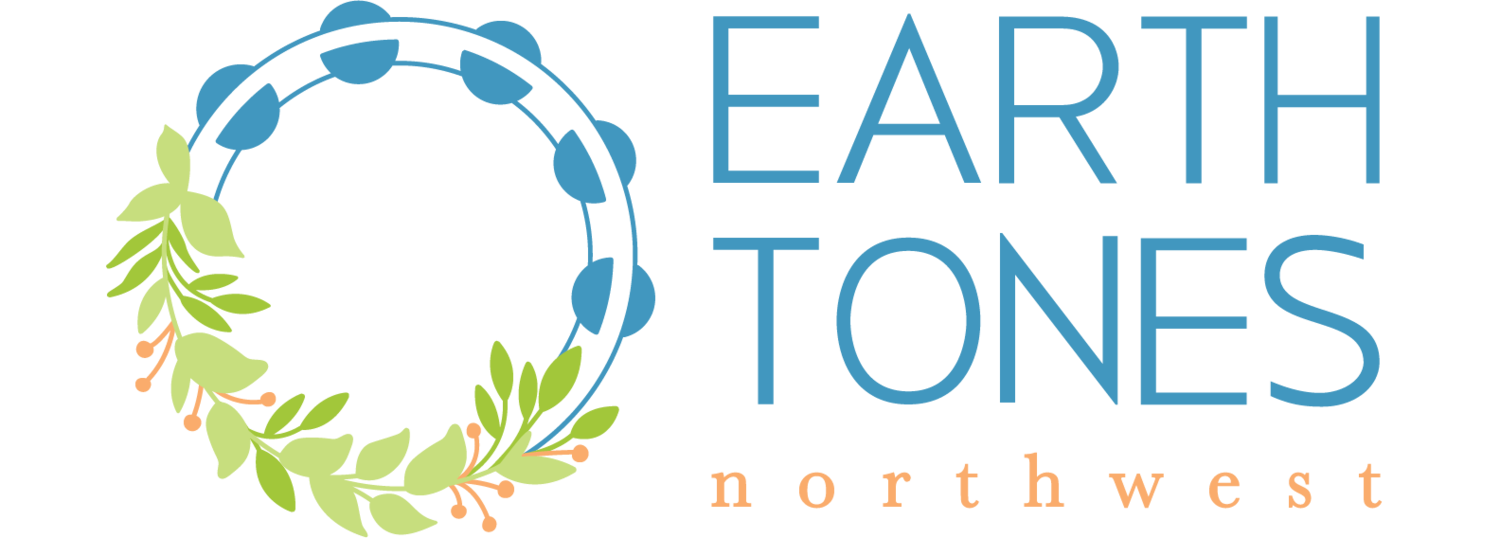Virtual Music Therapy: An Interview with Maggie Johnson, MT-BC
This past month, Earthtones Northwest therapists began providing virtual sessions for the first time in our 24-year history! This post is the first in a series about our therapists’ favorite moments, discoveries, and creative solutions. First up: board certified music therapist Maggie Johnson!
Image description: music therapist, Maggie Johnson, is sitting close to the camera. She is wearing all black and playing the flute with a slight smile on her face. Her backdrop is a room with white walls; to her left is a closed door and to her right is a bookshelf.
What unexpected benefits are you aware of in your virtual music therapy work?
The advantages of connecting virtually have completely blown me away! For some, we’ve evolved the caregiver’s in-session role to that similar to a co-therapist. This benefits both parties and expands their way of relating to each other. For other participants, engaging in virtual sessions seems to have equal ease as calling one’s grandchild on the phone, whether they have ever experienced a video call prior to virtual music therapy sessions or not. There’s also the obvious benefit of being able to connect virtually anyone: friends from your day program, family living across the country, or any member of our team. It can be a real party!
“The benefits of connecting virtually [with clients] have completely blown me away! … From a ‘musician’s toolbox’ point of view, I can have my full live performance set-up in my home studio.'
Thinking of my clients, most of whom had never done a video call prior to our virtual music therapy sessions, increasing one’s access to virtual music therapy also increases their access to the digital world in general. A client of mine asked me the other day, “Can I call anyone on this thing?”
From a ‘musician’s toolbox’ point of view, I can have my full live performance set-up in my home studio with amp and pedals. Having unbarred access to my keyboard, or my looping pedal with guitar has been very fun. I’m also having fun exploring all things MIDI (electronic music).
Tell us about some of your favorite session moments this past month.
A new client and I were conducting Holst together and I could tell they had played the piece in the past by how intricately they were conducting. In one moment we laughed as we mimed our instrument parts, in the next, it was as though we were conducting a full orchestra in earnest! I've also really enjoyed creating musical scores to my client’s favorite story books or graphic novels with them in sessions.
'Our drive to make music doesn’t go away just because we can’t be physically close. The joy of music is as important as ever.'
How does virtual music therapy support your clients' well-being?
Just as ever, active music making for self-expression and creativity on the part of the participants is a prominent focus of my work. Another salient goal is one that we are all experiencing: navigating through COVID-19 related changes on our own terms.
What have you learned throughout this process?
Our drive to make music doesn’t go away just because we can’t be physically close. The joy of music is as important as ever in this time. With the right supports, anyone can benefit from virtual music and horticultural therapy sessions. They might have components that are different from an in-person session but I continue to be affirmed that it is SO worth exploring the possibility. Our clients and families, my team, and our partner agencies are making it happen!
'With the right supports, anyone can benefit from virtual music and horticultural therapy sessions.'
It is my mission in life to honor creativity and give it the full respect that it deserves, knowing that such a practice is what opens the door to life experiences that create meaning. I can’t help but see parallels to what developing one’s creativity in the arts does for one’s life and health. It plays out in identifiable ways for us all, including myself, right now.


